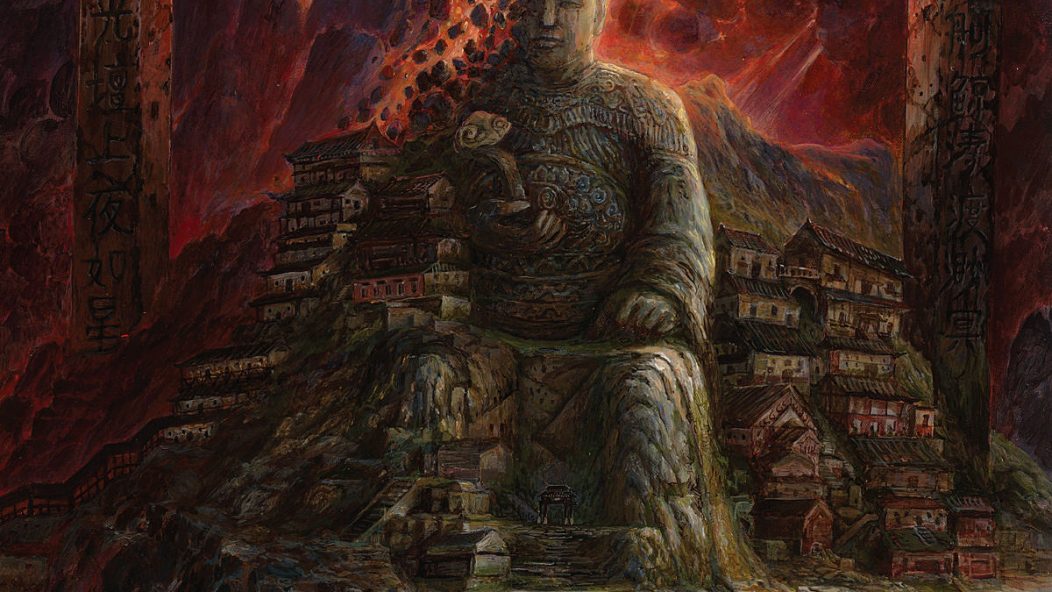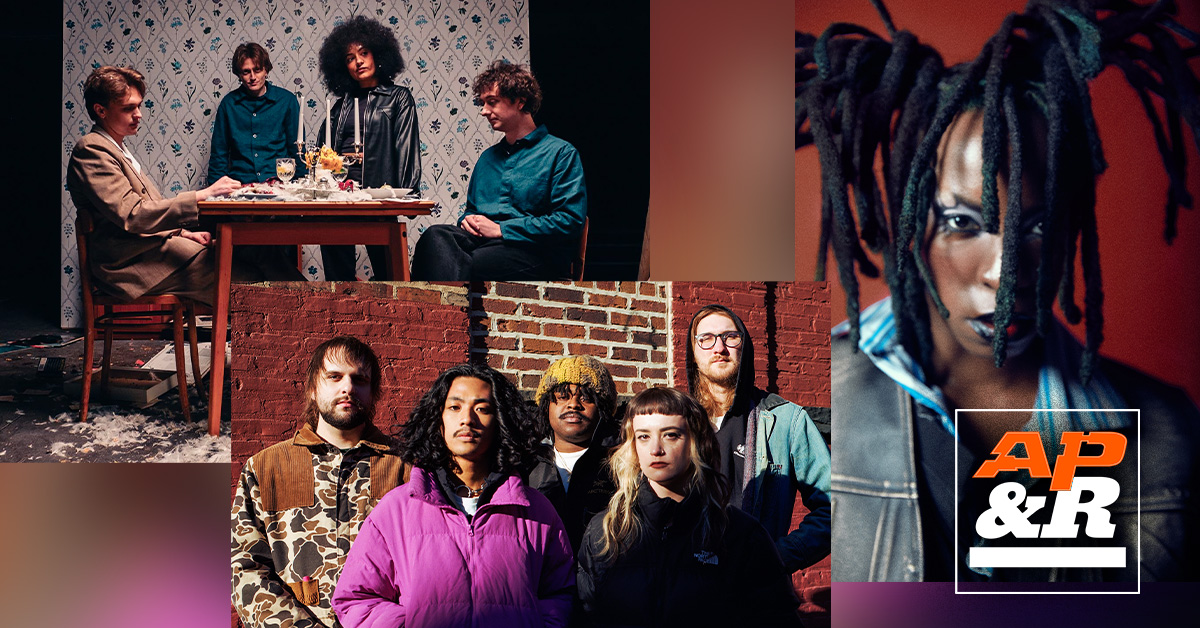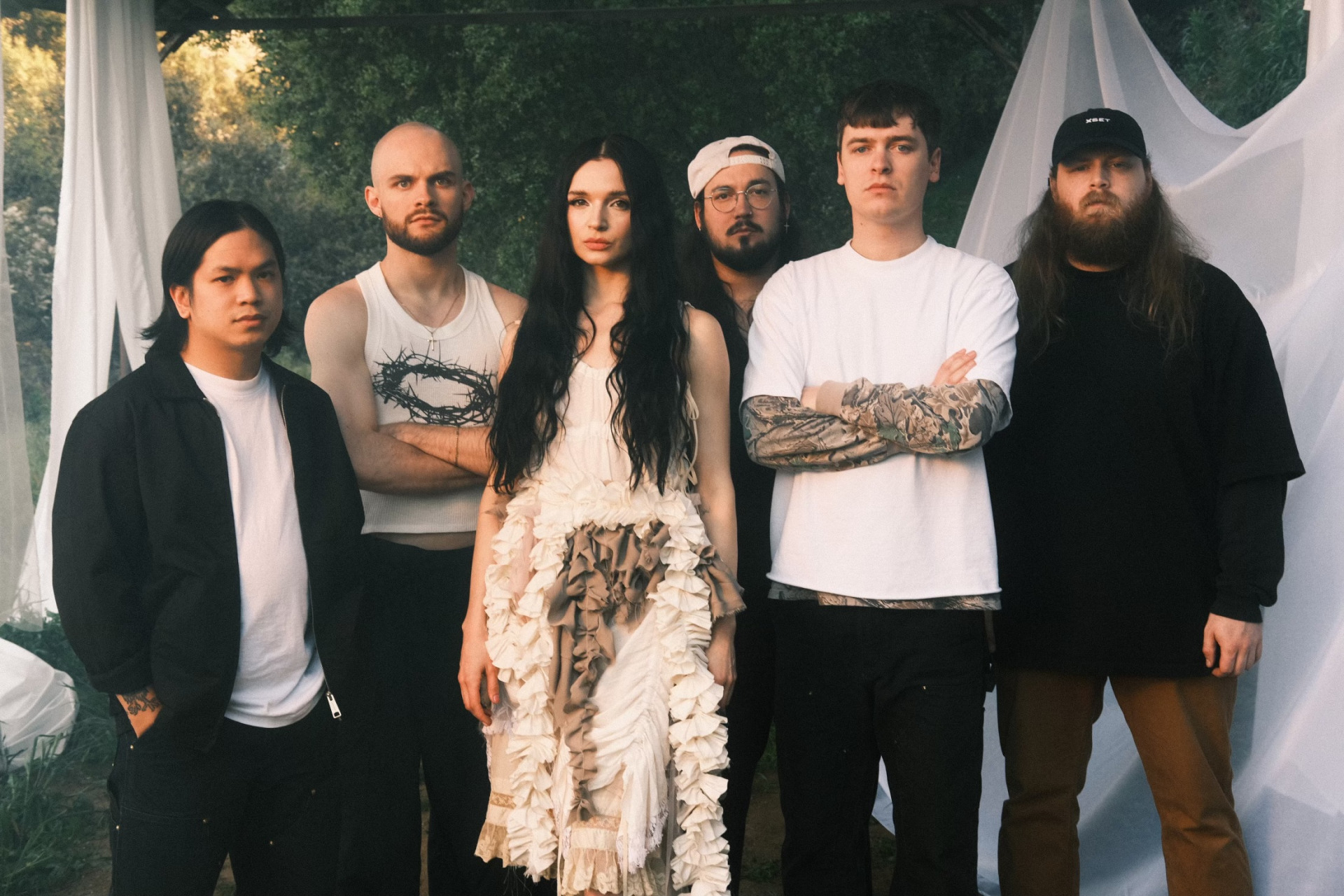
Ripped To Shreds Tears Into Death Metal's Blind Spots on "劇變 (Jubian)" (Interview)
There’s something highly intriguing about ancient Asian history. Taiwanese/American multi-instrumentalist Andrew Lee, founder of death metal band Ripped To Shreds, has created an outlet to represent Asian Americans in extreme metal. On the band’s third full-length album, 劇變 (Jubian), Lee’s lyrical content, as well as the visual image, is based on Asian historical and mythical events such as Mazu (the Taiwanese sea goddess), the Korean War, and the Mukden Incident. Like a history lesson in grade school, Lee focuses on not political matters, but events that mean something to him.
Formed in 2016 in San Jose, Ripped To Shreds’ plethora of sub genres and varied musical influences keeps things fresh within the band’s modern death metal framework. Its eight tracks are decorated with surging grindcore elements and blasts of Swedish-laden OSDM, completed by some ’80s-style metal guitar hero leads. During a recent phone interview, Lee talked about the origins of the band, its new album, about representing Asian Americans in extreme metal, possible tour dates and more.
…
…
How does the album title 劇變 (Jubian), which translates to “upheaval,” tie in with the cover art and lyrics?
It’s mainly a feeling of great change, destruction. Just kind of an unpredictability with what’s going to happen with the world. You know something big is happening, right? And you know it’s gonna change the world; probably not for the better. And I guess that kind of ties in with the art. I had a painter from Beijing, his name is Guang Yang, to paint the cover. He did the previous album for me as well. The instruction I gave him was, I want this big statue of Mazu, who is a Taiwanese sea goddess. She’s worshiped in the southern parts of China and I just wanted this statue to be destroyed in some way. He took those super vague instructions and then turned into something really cool. What I’m going for is, you can kind of see Mazu as a symbol for Taiwan, or the southern parts of China. And I didn’t think of it in such a way that I’m talking about that region, specifically. But I thought it was something that stood for someone I cared about. I wanted to show my pessimism or doubt about how things are going. There’s a whole bunch of different temples dedicated to Mazu because she’s a goddess for fishermen. And that’s really important whenever you’re in any of the port cities.
I think it’s cool that you explore these ancient and recent Chinese culture and historical themes. What is the importance of exposing these stories in history through your music and lyrics?
For me, it’s because there’s not a ton of representation for Asian Americans in metal. There’s real slim pickings if you want to look for Asian representation in metal in the West. So, when I think about how I want to present Ripped to Shreds, I guess I’m kind of like looking at myself when I was a kid, and having things that I would have liked to have seen when I was first getting into metal.
On a few tracks, you sing in your native tongue, is this just called for on certain instances?
I find it important to have songs on each album to be in Mandarin. We need to put it that way. I don’t think I consciously think this song or these lyrics are particularly suited to being sung in Chinese. I don’t think about it in terms of the subject matter, it just seems like (certain tracks) are good to sing in Chinese, so let’s do it that way.
Most of the lyrics are based on historic events. For instance; “Violent Compulsion for Conquest” was inspired by the Mukden Incident. What compelled you to write about this subject?
It’s one of the biggest impetus for World War II in general. It’s one of those flash points in history that kicked off the larger war in the region. If you ask what exactly inspired it, I think it’s just an interesting, brutal story.
Does the same go for “Reek of Burning Freedom”? Is that about the bombing campaign waged on North Korea during the Korean War?
That one is more of an anti war song. Because America, in the name of so-called democracy, goes off and meddles in all sorts of other countries’ affairs. We’ve been doing that for a really long time now. I feel like Americans don’t really think about what that actually means. I think we kind of got a view of it from Vietnam. But my impression is a lot of people think about Vietnam as the United States going over there and getting their butts kicked, rather than the United States invading another country.
Musically, I love that whole Swedish death metal guitar sound in the vein of Entombed and Dismember. How did you come up with your guitar tone or settle on this sound for Ripped to Shreds?
I just love Entombed. And Dismember was one of those bands that I got into super early when I was first getting into metal in general. They have a pretty melodic sound; they’re really easy to latch onto even when you’re not super acclimated to the more raw or brutal sounding stuff. I have a collection of four original HM-2 pedals and I’ve got two of the new Waza reissues. I’ve got maybe five or six different clones. I’m actually working with a dude from New Zealand right now and we’re coming up with a kind of custom modded HM-2 (pedal). I just love that chainsaw sound. It sounds ridiculous and brutal. It is a little bit frustrating when people automatically assume that if you’re using HM-2, you are playing Entombed riffs. There are a couple of songs on the new album where (I wanted) to make it sound like Entombed. But I think for the most part on the new album, it’s a lot of Autopsy, a lot of Finnish death metal; It’s a lot of grindcore. So for me, I love Entombed, but I don’t often want to write a song that could have been written by Entombed.
The track “In Solitude” is part 3 of the ongoing “Sun Moon Holy Cult” saga that appears on your first two albums. What’s the concept behind this three-part song?
I’m a big Dream Theater fan; I love how they have these super long epic songs. I like how they bring back themes with different variations. So, I just wanted to do something kind of similar and challenge myself to come up with these crazy epic death metal songs. The main thing I notice about a lot of long death metal songs, they’re super repetitive. I love Vital Remains, but they take maybe three or four riffs and then just repeat those for like 10 minutes. Or if you listen to Spectral Voice or Hooded Menace, they play super, super slow. So I kind of wanted to challenge myself to write really long, epic songs that weren’t just super repetitive or super slow. The whole thing is kind of like just challenging myself to push my limits as a songwriter, and try to keep it interesting.
The album was recorded and mixed by you in your home studio and mastered by Damian Herring at Subterranean Watchtower. What were you wanting to achieve sound wise with the overall mix?
When I send stuff off to Damian to master, I trust him. I love the way that he makes things sound. I didn’t have him mix the album because I have a very specific vision for the way I want certain elements to sound. So for example, every blast beat section has to be automated exactly the way I want it. I set all the snare levels and the reverb because I want my blast beats to sound a certain way. It’s kind of difficult and tedious to communicate all that stuff to another engineer. I love his work. I love the way that he approaches music, which is why I have him master so much of my stuff. Whenever I hand off something to Damian, I just tell him to make it sound good. And whenever he hands it back, it’s usually fucking awesome.
Did you record every instrument or did other members record their parts?
This new album is a band effort. Everyone plays on it. The drums I’ve recorded here (at my home studio). My guitarist and bassist both play in another crossover band called Doomsday. Marco is the drummer and he’s also an engineer. On the first day of drum recording, I had Marco come over and help me get everything set up and ready and make sure everything’s sounding good. So he helped me co-engineer the drums. But for everything else, I was the engineer and producer for all the recordings here.
What’s the camaraderie and musical chemistry between bandmates Ryan, Brian and Michael? Have you guys played together live before?
Yeah. I’ve been together with this lineup at the end of 2019. I was getting ready for the release of Luan and I wanted to actually play a couple shows to support it. The first band recording that we did was when we recorded “Bone Ritual” for the Metal Massacre compilation on Metal Blade. And these guys are great. I think it’s partially because everyone has their main project that they focus on. I also have a lot of different avenues to express my creativity. There’s not a lot of ego involved. I feel like it’s really easy. I hope the other guys think it’s really easy! (laughs) But at least they’ve never complained or brought anything up yet.
You also play in different bands, how do you balance your schedule and how do you instinctively know what riffs are appropriate for each group you’re in?
Scheduling is actually pretty easy, because Ripped to Shreds is the only live band. I’m trying to play Houkago Grind Time live, but I haven’t really had a whole lot of time to put it together because I don’t want to bring other people into that project. I’m just going to do it myself as a one man band. So I haven’t had time to get everything ready for that. And I have a whole bunch of different kinds of ideas about how I want to present myself on stage for them. But because I really only have one live band, it’s pretty simple for me to schedule stuff. When I write, I don’t really write for the sake of writing. It’s not like I come up with something and then decide what I want to use it for. It’s more like if someone hits me up for a split as HGT or I want to make a vocal song, I’ll start writing for that. So I usually have an idea of what band I’m writing for before I even pick up the instrument.
What’s your plans for the rest of this year and into next year? Will there be any live shows coming up?
I think we’ve got some kind of a live stream thing that we’re supposed to be doing with Bandcamp at the end of the year. And next year we’re going on tour in Europe, we’re playing 10 days and ending at Bloodshed Fest in the Netherlands. And we’re kind of talking with some of our friends about playing a couple of shows in the Pacific Northwest. That stuff’s not set in stone yet, but I think next year is going to be pretty busy.
..
Jubian was released on October 14th, 2022 via Relapse Records. Pick up a copy on red vinyl.
For more with Andrew Lee, listen to our 2020 podcast interview.










